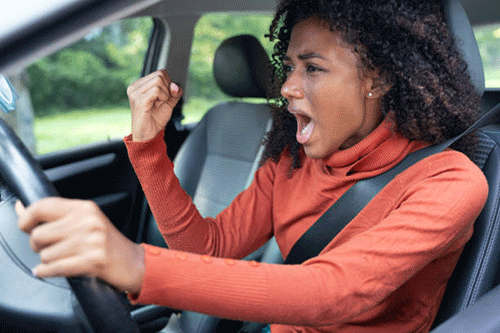Community Policing Officer
It is human nature that drivers find themselves operating a vehicle aggressively or becoming easily irritated by other drivers on the road. This is mostly an emotional response, and it is usually uncontrolled anger that is provoked by another driver’s irritating action. Additional factors, such as crowded roads or hot, uncomfortable weather also contribute to boosting angry reactions behind the steering wheel.
Road rage comes in all different forms – all of which are dangerous. This behaviour includes rude verbal insults, yelling, physical threats, obscene gestures or dangerous driving methods targeted at other drivers – all in an effort to intimidate them or release frustration.
The most observed forms of road rage methods include cutting off other drivers, making uncouth gestures at other drivers, following too closely, driving in the wrong lane or driving too slowly.
When a driver acts on their rage, they become distracted from the road and begin to drive carelessly – and this, more than often, is likely to cause an accident while the drivers are in this frustrated state. These actions can result in physical injury, property damage or even death. Drivers susceptible to road rage drivers can trigger other drivers to respond angrily to their conduct – and when this happens, the situation can quickly escalate and lead to serious consequences.
Although there are no laws that specifically govern aggressive driving, when road rage causes accidents, injuries or death, angry drivers can be charged with reckless and negligent driving in terms of the Road Traffic and Transport Act (RTTA), Act 22 of 1999, or charged with other crimes, which include assault, homicide or even murder in terms of the Criminal Procedure Act (CPA) Act 51of 1977.
Most drivers who engage in this type of behaviour do not consider their actions aggressive. As emotional beings, it is normal to feel frustrated and impatient on the road, especially when you are stuck in traffic or driving alongside a negligent driver.
Driving while angry is not a crime; however, engaging in destructive behaviour can cause serious harm to other road users.
As a driver, if you are upset, take some time to calm down and take deep breaths before you get behind the wheel because your frustration can easily be transferred onto the road. When on a tight schedule, drivers are advised to depart early because traffic becomes more frustrating when one is in a hurry. Have you ever noticed that when in a hurry it seems all other drivers are moving extra slowly?
However, if you have more time available, you will feel less rushed and have less of a reason to become angry at other divers, particularly if a fellow road user is also acting aggressively. Not everyone has the same levels of self-restraint – and remember that conflict can only continue to exist with participation.
Whether you arrive a few minutes late or miss that green
light, it does not change the
outcome of your drive.
You still made it to your destination – and tomorrow is a new day!
Always keep in mind that anger is just a transitory state of consciousness.
The responsibility of road safety is everyone’s concern, and executing your duties, as a driver, is essential in contributing to safety on our roads. The Windhoek City Police can be contacted at 061 2902239 or the toll-free no: 061-302 302.


